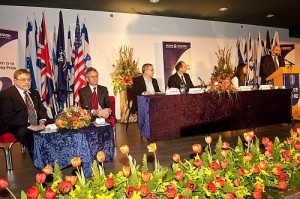Prof. Manuel Trajtenberg in the Harvey Award Ceremony at the Technion: the Israeli Economy Must Undergo Change, and Turn from a High Tech-Oriented Economy into a Science-Oriented Economy
 The prestigious Technion prize was awarded this year to Prof. Judea Pearl and Prof. Sir Richard Friend
The prestigious Technion prize was awarded this year to Prof. Judea Pearl and Prof. Sir Richard Friend
The Harvey Prize was awarded this year to Profs. Judea Pearl and Sir Richard Friend.
Prof. Trajtenberg added that the world’s wonder at Israel’s quality R&D is justified, and yet it is important to understand that nowadays most of investment is in the D, namely development. “We must invest so much more in the R, research, and in bridging between the two, namely between industry and academy, through programs such as MAGNET. We must also extend our pursuit of innovation beyond the realms of high-tech, as is already the case with water and energy, fields that have turned from ‘traditional’ industries to industries involving innovative technologies”.
The Harvey Prize is awarded by the Technion in recognition of great contributions to the advancement of humanity in science and technology and human health, and to the advancement of peace in the Middle East. Among the recipients of the Harvey Prize are scientists and others worldwide, many of whom have gone on to win the Nobel Prize. Technion President Prof. Peretz Lavie said the awarding of the Prize is a “celebration of science”, and added that the Harvey Prize was awarded for the first time in 1972, in the presence of Leo Harvey himself, who passed away a year later, Israel’s President at the time Zalman Shazar, and Israel’s Prime Minister at the time Golda Meir. 75 prizes have been awarded to date, and 13 of the winners later became Noble Laureates.
Prof. Judea Pearl of UCLA is a leading artificial intelligence expert, who less than two weeks ago was announced winner of the 2011 Turing Award, known also as “the Noble Prize of Computing”. Pearl is a member of the National Academy of Engineering, AAAI and IEEE, and President of the Daniel Pearl Foundation, named after his son, a journalist who was killed in Pakistan.
Prof. Pearl’s work has laid the foundations for the treatment of uncertainty in computerized systems, and its applications range over a wide spectrum of disciplines: security, medicine, genetics, and natural language understanding. Alfred Spector, Vice President of Research and Special Initiatives at
Google, said that “modern artificial intelligence applications – robotics, smart cars, speech recognition and machine translation – have an interest in uncertainty. Prior to the innovations developed by Pearl, most artificial intelligence systems relied on Boolean logic – they ‘understood’ truth and falsehood, and could therefore deal well with challenges such as chess – but they did not deal successfully with ‘maybe’.”
In its reasons for his win, the Harvey Prize Committee said that Prof. Pearl has “laid, through courageous and far-sighted research the theoretical foundations for the presentation of knowledge and reasoning in computer science. His theories of inference under uncertainty, and in particular the Bayesian Networks approach, have influenced varied disciplines, including artificial intelligence, statistics, philosophy, health, economics, social sciences and cerebral cognitive processes. The Harvey Prize in Science and Technology is awarded to Prof. Pearl in recognition of the breakthroughs that are embodied in his researches and their influence on multitudes of spheres of our life.”
Prof. Sir Richard Friend of the University of Cambridge has “invented” organic electronics (printed plastic electronics), among the applications of which are plastic LED devices (OLED displays), advanced photovoltaic cells, the electronic newspaper, and thin flexible displays.
Prof. Friend has over twenty patents to his name, and his historical paper dated 1990 was has been quoted over 8,000 time. “Happily, some of the Technion’s excellent students have chosen to do their post-doctorates with me, and have exposed me to Technion quality”, said Prof. Friend, and noted Profs. Gitti Frey and Nir Tessler. “I followed them to the Technion, and have been visiting professor here for many years”.
At the end of the 1980s, the OLED, a light-emitting organic (plastic) diode, was discovered in Prof. Friend’s lab. In 1996, the first laser based on this technology, namely on semiconductor light-emitting plastic, was manufactured. In 1998, the first integrated optoelectronic component, which paved the way to the creation of plastic integrated circuits, was released. Prof. Friend, a pioneer in the field, is a leading player both in the scientific research of these materials and in their translation into varied applications.
In its decision to award the Prize to Prof. Friend, the Harvey Prize Committee cited that “his breakthrough research made possible deep understanding of electronic and optical processes in polymer conductors for realizing a range of devices including field-effect transistors, light-emitting diodes, photovoltaic cells and lasers. Demonstrating scientific and technological leadership, Prof. Friend has made a decisive contribution to the harnessing of science to the creation of this new technology, as evidenced by, inter alia, the two successful spin-off companies he founded. The Harvey Prize in Science and Technology is awarded to Prof. Sir Richard Friend in recognition of his outstanding contributions to the development of a new semiconductor family and his impact on our lives.”
The Harvey Prize was awarded for the first time in 1972, from a fund established by Leo M. Harvey, of Blessed Memory, of Los Angeles, in recognition of great contributions to the advancement of humanity. Every year, the fund awards $75,000 to each of the winners.
Above (left to right): Prof. Judea Pearl, Prof. Sir Richard Friend, Prof. Moshe Sidi, Prof. Oded Shmueli, Prof. Gitti Frey, Technion President Prof. Peretz Lavie. Photo: Shlomo Shoham, Technion Spokesman


